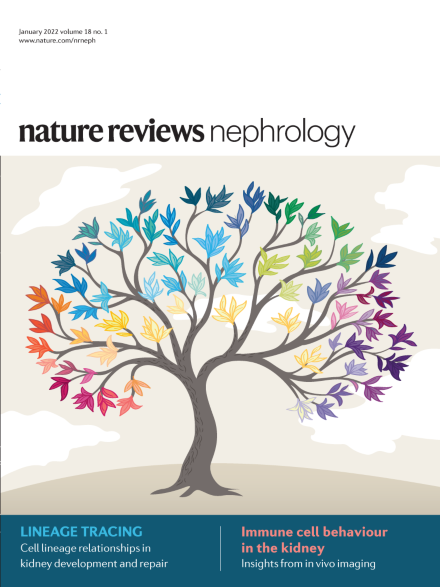Association of LILRB3 variants with kidney transplant failure in African Americans
IF 39.8
1区 医学
Q1 UROLOGY & NEPHROLOGY
引用次数: 0

LILRB3变异与非裔美国人肾移植失败的关系
即使考虑到HLA不匹配和社会经济地位,非裔美国人肾移植受者比其他种族和民族群体表现出更高的移植失败风险,这表明其他风险因素也起作用。现在,研究人员已经在白细胞免疫球蛋白样受体B3 (LILRB3)中发现了一个由四个连续错义单核苷酸多态性(snp)组成的簇,该簇在非裔美国人中富集,代表了死亡审查移植损失和免疫相关疾病的风险因素。使用这种方法,研究人员在LILRB3中发现了一个由四个相连的错义snp组成的簇(称为LILRB3- 4snp),主要在非裔美国人个体中检测到,并与不良移植结果相关。在其他移植队列和生物银行数据中的进一步评估显示,lilrb3 - 4snp与移植物丢失和进展为肾衰竭的风险增加相关。这些分析还确定了LILRB3- 4snp与免疫相关病理之间的关联,这与LILRB3作为免疫反应的负调节因子的已知作用一致。多组学分析还表明,携带lilrb3 - 4snp的移植受者表现出炎症增加,其特征是T细胞和B细胞信号通路的持续激活,以及单核细胞铁凋亡,而巨噬细胞系的功能研究表明,lilrb3 - 4snp表达的致病作用可以被铁凋亡抑制剂逆转。张说:“这项工作将基因发现与转化医学联系起来,为通过精确治疗解决移植结果的差异提供了一条途径。”研究人员目前正在计划进一步的研究,以建立LILRB3-4SNPs集群作为非裔美国移植受者移植失败风险分层的遗传生物标志物,并在临床前模型中评估铁下垂抑制剂的疗效。
本文章由计算机程序翻译,如有差异,请以英文原文为准。
求助全文
约1分钟内获得全文
求助全文
来源期刊

Nature Reviews Nephrology
医学-泌尿学与肾脏学
CiteScore
39.00
自引率
1.20%
发文量
127
审稿时长
6-12 weeks
期刊介绍:
Nature Reviews Nephrology aims to be the premier source of reviews and commentaries for the scientific communities it serves.
It strives to publish authoritative, accessible articles.
Articles are enhanced with clearly understandable figures, tables, and other display items.
Nature Reviews Nephrology publishes Research Highlights, News & Views, Comments, Reviews, Perspectives, and Consensus Statements.
The content is relevant to nephrologists and basic science researchers.
The broad scope of the journal ensures that the work reaches the widest possible audience.
 求助内容:
求助内容: 应助结果提醒方式:
应助结果提醒方式:


